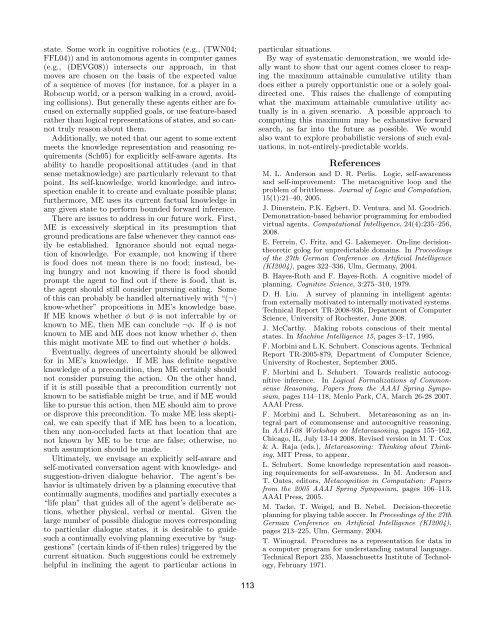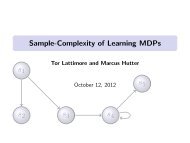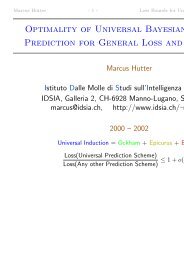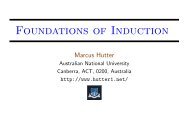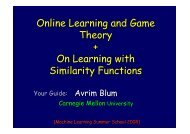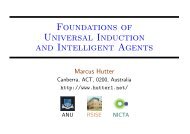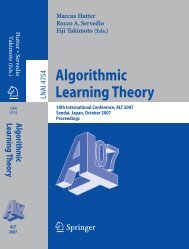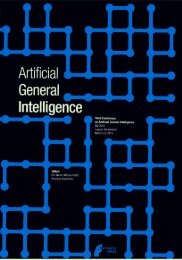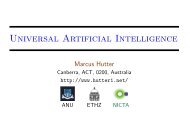A Framework for Evaluating Early-Stage Human - of Marcus Hutter
A Framework for Evaluating Early-Stage Human - of Marcus Hutter
A Framework for Evaluating Early-Stage Human - of Marcus Hutter
Create successful ePaper yourself
Turn your PDF publications into a flip-book with our unique Google optimized e-Paper software.
state. Some work in cognitive robotics (e.g., (TWN04;<br />
FFL04)) and in autonomous agents in computer games<br />
(e.g., (DEVG08)) intersects our approach, in that<br />
moves are chosen on the basis <strong>of</strong> the expected value<br />
<strong>of</strong> a sequence <strong>of</strong> moves (<strong>for</strong> instance, <strong>for</strong> a player in a<br />
Robocup world, or a person walking in a crowd, avoiding<br />
collisions). But generally these agents either are focused<br />
on externally supplied goals, or use feature-based<br />
rather than logical representations <strong>of</strong> states, and so cannot<br />
truly reason about them.<br />
Additionally, we noted that our agent to some extent<br />
meets the knowledge representation and reasoning requirements<br />
(Sch05) <strong>for</strong> explicitly self-aware agents. Its<br />
ability to handle propositional attitudes (and in that<br />
sense metaknowledge) are particularly relevant to that<br />
point. Its self-knowledge, world knowledge, and introspection<br />
enable it to create and evaluate possible plans;<br />
furthermore, ME uses its current factual knowledge in<br />
any given state to per<strong>for</strong>m bounded <strong>for</strong>ward inference.<br />
There are issues to address in our future work. First,<br />
ME is excessively skeptical in its presumption that<br />
ground predications are false whenever they cannot easily<br />
be established. Ignorance should not equal negation<br />
<strong>of</strong> knowledge. For example, not knowing if there<br />
is food does not mean there is no food; instead, being<br />
hungry and not knowing if there is food should<br />
prompt the agent to find out if there is food, that is,<br />
the agent should still consider pursuing eating. Some<br />
<strong>of</strong> this can probably be handled alternatively with “(¬)<br />
know-whether” propositions in ME’s knowledge base.<br />
If ME knows whether φ but φ is not inferrable by or<br />
known to ME, then ME can conclude ¬φ. If φ is not<br />
known to ME and ME does not know whether φ, then<br />
this might motivate ME to find out whether φ holds.<br />
Eventually, degrees <strong>of</strong> uncertainty should be allowed<br />
<strong>for</strong> in ME’s knowledge. If ME has definite negative<br />
knowledge <strong>of</strong> a precondition, then ME certainly should<br />
not consider pursuing the action. On the other hand,<br />
if it is still possible that a precondition currently not<br />
known to be satisfiable might be true, and if ME would<br />
like to pursue this action, then ME should aim to prove<br />
or disprove this precondition. To make ME less skeptical,<br />
we can specify that if ME has been to a location,<br />
then any non-occluded facts at that location that are<br />
not known by ME to be true are false; otherwise, no<br />
such assumption should be made.<br />
Ultimately, we envisage an explicitly self-aware and<br />
self-motivated conversation agent with knowledge- and<br />
suggestion-driven dialogue behavior. The agent’s behavior<br />
is ultimately driven by a planning executive that<br />
continually augments, modifies and partially executes a<br />
“life plan” that guides all <strong>of</strong> the agent’s deliberate actions,<br />
whether physical, verbal or mental. Given the<br />
large number <strong>of</strong> possible dialogue moves corresponding<br />
to particular dialogue states, it is desirable to guide<br />
such a continually evolving planning executive by “suggestions”<br />
(certain kinds <strong>of</strong> if-then rules) triggered by the<br />
current situation. Such suggestions could be extremely<br />
helpful in inclining the agent to particular actions in<br />
113<br />
particular situations.<br />
By way <strong>of</strong> systematic demonstration, we would ideally<br />
want to show that our agent comes closer to reaping<br />
the maximum attainable cumulative utility than<br />
does either a purely opportunistic one or a solely goaldirected<br />
one. This raises the challenge <strong>of</strong> computing<br />
what the maximum attainable cumulative utility actually<br />
is in a given scenario. A possible approach to<br />
computing this maximum may be exhaustive <strong>for</strong>ward<br />
search, as far into the future as possible. We would<br />
also want to explore probabilistic versions <strong>of</strong> such evaluations,<br />
in not-entirely-predictable worlds.<br />
References<br />
M. L. Anderson and D. R. Perlis. Logic, self-awareness<br />
and self-improvement: The metacognitive loop and the<br />
problem <strong>of</strong> brittleness. Journal <strong>of</strong> Logic and Computation,<br />
15(1):21–40, 2005.<br />
J. Dinerstein, P.K. Egbert, D. Ventura, and M. Goodrich.<br />
Demonstration-based behavior programming <strong>for</strong> embodied<br />
virtual agents. Computational Intelligence, 24(4):235–256,<br />
2008.<br />
E. Ferrein, C. Fritz, and G. Lakemeyer. On-line decisiontheoretic<br />
golog <strong>for</strong> unpredictable domains. In Proceedings<br />
<strong>of</strong> the 27th German Conference on Artificial Intelligence<br />
(KI2004), pages 322–336, Ulm, Germany, 2004.<br />
B. Hayes-Roth and F. Hayes-Roth. A cognitive model <strong>of</strong><br />
planning. Cognitive Science, 3:275–310, 1979.<br />
D. H. Liu. A survey <strong>of</strong> planning in intelligent agents:<br />
from externally motivated to internally motivated systems.<br />
Technical Report TR-2008-936, Department <strong>of</strong> Computer<br />
Science, University <strong>of</strong> Rochester, June 2008.<br />
J. McCarthy. Making robots conscious <strong>of</strong> their mental<br />
states. In Machine Intelligence 15, pages 3–17, 1995.<br />
F. Morbini and L.K. Schubert. Conscious agents. Technical<br />
Report TR-2005-879, Department <strong>of</strong> Computer Science,<br />
University <strong>of</strong> Rochester, September 2005.<br />
F. Morbini and L. Schubert. Towards realistic autocognitive<br />
inference. In Logical Formalizations <strong>of</strong> Commonsense<br />
Reasoning, Papers from the AAAI Spring Symposium,<br />
pages 114–118, Menlo Park, CA, March 26-28 2007.<br />
AAAI Press.<br />
F. Morbini and L. Schubert. Metareasoning as an integral<br />
part <strong>of</strong> commonsense and autocognitive reasoning.<br />
In AAAI-08 Workshop on Metareasoning, pages 155–162,<br />
Chicago, IL, July 13-14 2008. Revised version in M. T. Cox<br />
& A. Raja (eds.), Metareasoning: Thinking about Thinking,<br />
MIT Press, to appear.<br />
L. Schubert. Some knowledge representation and reasoning<br />
requirements <strong>for</strong> self-awareness. In M. Anderson and<br />
T. Oates, editors, Metacognition in Computation: Papers<br />
from the 2005 AAAI Spring Symposium, pages 106–113.<br />
AAAI Press, 2005.<br />
M. Tacke, T. Weigel, and B. Nebel. Decision-theoretic<br />
planning <strong>for</strong> playing table soccer. In Proceedings <strong>of</strong> the 27th<br />
German Conference on Artificial Intelligence (KI2004),<br />
pages 213–225, Ulm, Germany, 2004.<br />
T. Winograd. Procedures as a representation <strong>for</strong> data in<br />
a computer program <strong>for</strong> understanding natural language.<br />
Technical Report 235, Massachusetts Institute <strong>of</strong> Technology,<br />
February 1971.


